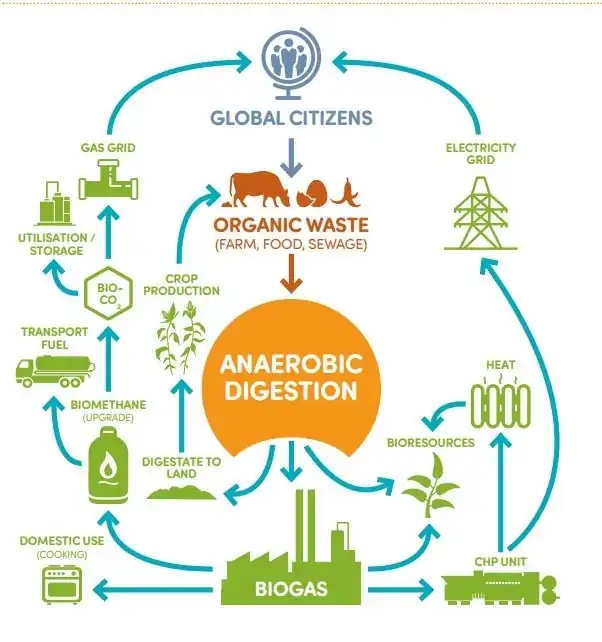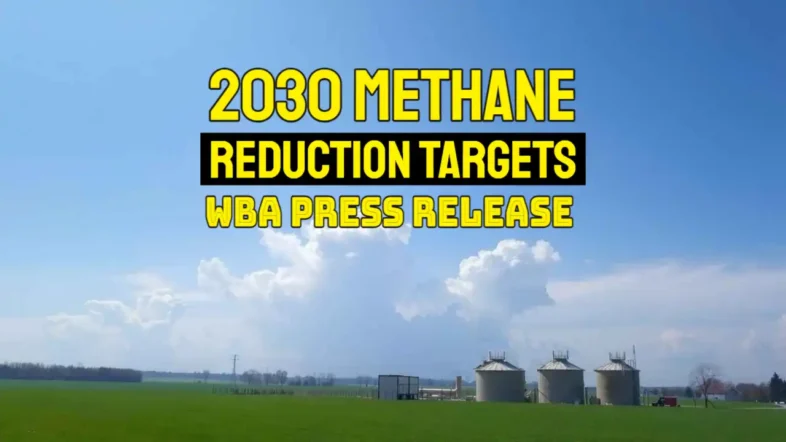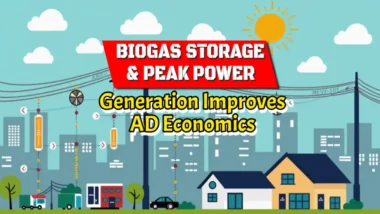New Global Standards and Methane Reduction Targets Make Biogas Key to Meeting 2030 Methane Reduction Targets
Tools for Climate Action
As nations worldwide scramble to address climate change, a critical breakthrough in biogas deployment could revolutionize how countries meet their 2030 methane reduction targets. The World Biogas Association (WBA) has unveiled groundbreaking online tools designed to fast-track the development of high-performing and sustainable biogas industries globally, potentially delivering up to 50% of the Global Methane Pledge commitments.
The Global Methane Pledge committed 155 countries to:
- reduce global anthropogenic methane emissions by at least 30% below 2020 levels by 2030
- Replace one-third of today’s fossil gas consumption
- and that would create 10–15 million jobs worldwide.
Standardized Frameworks Overcome Regulatory Barriers
These innovative tools—the Global Biogas Regulatory Framework (GBRF) and the International Anaerobic Digestion Certification Scheme (ADCS International)—provide governments and industry stakeholders with standardized approaches to overcome regulatory barriers that have historically slowed biogas adoption.
Coming at a critical moment when the world has exceeded the 1.5°C warming threshold for the first time, these developments represent a significant leap forward in the fight against climate change.

Immediate Impact on Potent Greenhouse Gases
Anaerobic Digestion (AD), the process that transforms organic waste into renewable energy and valuable bioresources, stands as the most immediately deployable technology to reduce methane emissions—a greenhouse gas 84 times more potent than CO₂ over a 20-year period. With proper implementation guided by these new standards, the biogas industry could mitigate an impressive 10-13% of total global greenhouse gas emissions while simultaneously creating green jobs and delivering substantial social benefits worldwide.
Global Collaboration Drives Implementation
The WBA's #MakingBiogasHappen programme, backed by the Global Methane Hub, TotalEnergies, and GHD, has brought together international experts to establish these common frameworks based on global best practices. With initial implementation already beginning in Brazil and India, these tools represent a transformative approach to tackling one of climate change's most urgent challenges—methane emissions from organic waste—while supporting countries' transitions to circular economies.
The WBA press release follows with additional insights:
WBA 14 April 2025 PRESS RELEASE:
Groundbreaking tools to fast-track biogas deployment and meet 2030 climate targets launched
The World Biogas Association (WBA) today launched new online tools to fast-track the development of high-performing and sustainable biogas industries worldwide. These tools, developed as part of WBA’s flagship #MakingBiogasHappen (MBH) programme, are set to transform how countries tackle methane emissions and organic wastes – key drivers of climate change and pollution.
Charlotte Morton OBE, Chief Executive at WBA, said:
“The launch of MBH comes at a critical moment in the fight against global warming. Reducing human-induced methane emissions is among the most cost-effective ways to slow it down and is essential to achieve the goals of the Paris Agreement. In 2024, the world exceeded the 1.5°C warming threshold for the first time. Yet, with rapid and decisive action, limiting temperature rise and achieving net zero CO₂ by 2050 remains within reach. The rapid development of the biogas industry will help us take a big leap towards this target while also creating green jobs and social benefits worldwide.”
Anaerobic Digestion (AD) – the process of turning organic waste into renewable energy, biofertiliser, bio-CO2 and other bioresources valuable to the circular economy – is widely recognised as the most immediately deployable technology to reduce methane emissions. With backing from the Global Methane Hub, TotalEnergies, and GHD, WBA launched the MBH programme in January 2024. Drawing on global best practice, the initiative provides governments and regulators with tools to overcome industry barriers and accelerate the deployment of anaerobic digestion at scale.
The two outputs launched today under MBH are:
- The Global Biogas Regulatory Framework (GBRF) – A ready-to-implement set of policies, regulations and standards designed to guide the rapid development of national biogas industries.
- The International Anaerobic Digestion Certification Scheme (ADCS International) – The world’s first global certification scheme for biogas plants, ensuring independently verified safety, environmental and operational performance.
Dr Pradeep Monga, Senior Advisor and Policy Director at WBA said:
“WBA analysis shows that biogas could deliver 50% of the Global Methane Pledge – which commits 155 countries to reduce global anthropogenic methane emissions by at least 30% below 2020 levels by 2030 – and mitigate 10–13% of total global greenhouse gas emissions. However, adoption of AD is often hampered by the lack of regulatory clarity and industry standards. The #MakingBiogasHappen programme seeks to address this.”
In developing the GBRF and ADCS International, WBA convened a global network of experts, including plant operators, policymakers, researchers and farmers. Their work established a common foundation of best practice and included a standardised life-cycle assessment framework to measure sustainability and efficiency.
The GBRF incorporates successful policy models from around the world, offering governments a shortcut to creating effective frameworks at the national or sub-national level – significantly reducing lead times for project planning, permitting, construction and investment.
From development to deployment
With the research phase complete, WBA is now supporting governments and stakeholders to implement the tools:
- GBRF – Rollout will begin in Brazil and India, with adaptation to country-specific conditions guided by national biogas action plans.
- ADCS International – The certification scheme will be localised on a country-by-country bases to align with existing standards and legislation, supporting compliance and accountability.
— PR ENDS —





